Below is an excerpt from The Red Circle, My Life in the navy seal sniper corps and how I trained America’s deadliest marksmen, by Brandon Webb. In this excerpt, Brandon Webb talks about Lanny Bassham’s Mental Management concept and how it relates to performance under pressure. After the excerpt are some ideas for applying the ideas to basketball.
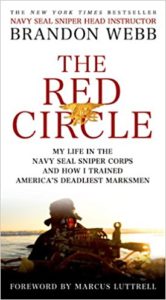
“Earlier I said that intellectual capacity was the first trait we look for in a sniper, that physical ability, as important as it is, is only 10 percent of the game. Of all the changes we made in the course, the one that felt most significant to me and that I was proudest of was our system for mental management.
When we first encountered the concept of mental management it was being taught exclusively to instructors as a way to help us coach and teach more effectively. In essense, it was all about where we as instructors focused a student’s attention
Say you’re doing batting practice with a kid and you notice he’s standing with his knees buckled in, shoulders misaligned, hands spread wide apart on the bat. Your impulse might be to start telling the kid everything he is doing wrong. If you focus his attention on all these wrong things, though, what you’re really doing is imprinting them into the poor kid’s mind, with the result that they start becoming ingrained habits. If you say, “Hey, you’re flinching. Every time the ball comes at you, you’re flinching! Stop Flinching!” then what the hell’s that little kid thinking about? He’s thinking about flinching.
If instead you say, “Hey, put your hands closer together, like this, and look: feet apart.” Then you’re showing him what to do rather than focusing his attention on what not to do.
A beginner typically starts out very focused on everything that’s going on. He’ll tend to absorb whatever is thrown at him. He is, in other words, highly programmable. The question is, as an instructor, what are you going to feed that rapt attention: bad habits or good habits?
This translated directly to instruction on the sniper course. In the old days instructors would bark at us for everything we did wrong. “Stop! You’re putting your finger on the trigger wrong! When you pull the trigger, you’re flinching! You’re jerking the barrel! You’re fucking up!” Suddenly we’d be thinking, Holy shit, there’re twenty things I’m doing wrong! Instead, we learned we could give a student three positive commands, three things he could do to correct those errors, and now he’d be developing good habits from day 1.
I have to admit, I was not completely on board with the whole concept of mental management when I first bumped into it, and I had to overcome my own skepticism. Shortly after Eric and I checked into NSWC to start working with the basic sniper course, we and a handful of other instructors were brought out to Scottsdale, AZ for a one week course taught by a champion marksman named Lanny Bassham, one of the pioneers of mental management. I was pretty dubious. Mental Management? What, like some positive-thinking guru? Oh boy. “Great,” I said to Eric, “when is Tony Robbins gonna come in and blow smoke up our asses?”
My attitude didn’t last long. Bassham is such an amazing, down-to-earth guy – and what he taught us was nothing short of incredible.
“I wasn’t good at sports,” Lanny told us. “I was of this weak, goofy kid. My dad said, ‘Hang in there, we’re going to find something for you. Everyone has a talent.’ ”
Lanny found his talent when he got into competitive shooting. After college he joined the army and was assigned to their marksmanship unit, which is comprised of the best match shooters in the world. By the time he went to shoot in the 1972 Olympics in Munich at the age of twenty-five, Lanny was famous the youngest world champion in the sport, and everyone expected him to shoot gold.
“I was on the bus with a bunch of competitors from different countries,” he said. “I heard some Russians in the seat behind me talking about how much pressure I must be under, with the entire reputation of the United States on my shoulders, and how they were glad they weren’t me – and they started getting in my head.”
By the time he stepped off the bus, Lanny was completely rattled. “I shot the worst match of my life,” he said. This being Lanny, the worst match of his life meant he came in second – but he was devastated. He came back to the States and visited with a handful of sports psychologists to see if he could understand what had happened to him, and they all said the same thing: “Hey it’s okay to be number two. Olympic silver is a great achievement, Lanny. You should be satisfied with that.”
Lanny said, “Screw that. I don’t think so!”
He spent the next few years interviewing dozens of gold-medal champions and recording all the specific traits he could identify in his interviews. They gave him an earful; you don’t get to be a gold medalist without doing an awful lot of self-examination and studying the best practices and key practice/performance tactics and strategies. Out of everything he heard, he found there were two specific traits they all shared in common.
First was complete and total confidence. Not arrogance or cockiness, but an absolute, unshakable confidence in their ability to perform regardless of adversity. Here’ how Lanny described this trait:
If I’m a champion tennis player, playing a championship game, it doesn’t matter if the strings start popping off, or my favorite racket breaks in the middle of the game. I’ll pick up a piece of plywood, tape it to a stick, and I’ll still beat you on the tennis court.
It’s an attitude that says, I will win no matter what. These people didn’t just want to win, they expected to win. When they went out to compete, they had already won in their minds.
We’ve all seen people who have the talent and skill to win, but at the last minute something goes wrong; their favorite bat breaks, or a golf swing misses, or something in their environment distracts them – the way Lanny was psyched out by the Russian taunts – and their game unravels. It didn’t unravel because the bat broke, Lanny was saying, or because the pitch went wild, or because of the other team’s taunt. It unraveled because it was vulnerable.
For champions that doesn’t happen. Their game is invulnerable. That’s the kind of confidence Lanny was talking about – and that was the kind of confidence we wanted to instill in our sniper course graduates.
The other trait was that they all did some kind of mental rehearsal- closing their eyes and practicing their winning game in their heads, over and over again.
Lanny told us about a navy pilot he met in the seventies name Captain Jack Sands. Captain Sands was shot down while serving in Vietnam and spent seven years in a prison camp in Hanoi, confined in isolation with no phyical activity. In order to preserve his sanity, he decided to practice his golf game. Of course, he couldn’t physically play golf – but the 5′ x 5′ cage he was in couldn’t prevent him from creating a course in his mind. In his imagination he evoked an image of a beautiful country club course, placed himself there, and let himself experience it all in great detail. He saw himself dressed in golfing clothes, smelled the trees and grass, and felt himself making each stroke as he played. Every day, for seven years, Captain Sands played a full eighteen holes in his mind while his body sat in his cage. He played it perfectly, never hooking slicing, or missing a single shot or putt. Hey, he was making it all up, right? Why not make it perfect?
Here was the amazing part. Before joining the navy, Captain Sands was an average weekend golfer, barely breaking 100. After he was finally released from his captivity and made his way home, he eventually got out onto a real grass-and-air golf course, and his first day out on the green he shot a stunning score of 74. He had taken more than 20 strokes off his game – without one laying a hand on a club. (By the way, some have claimed this story is an urban legen and there was no such person. It’s no urban legend: Lanny sat next to the guy on a seven-hour flight to a world championship match they attended together.)
The point, said Lanny, was that your reality is defined by your mind, not your external enironment. Jack Sand’s golf game changed so dramatically because that was how he had programmed his brain to see it.
Lanny went on to tell us about a national shooting championship he participated in. As part of his preparation, he had spent time mentally rehearsing the moment when he would be kneeling there and suddenly realize, Holy shit, I’m about to shoot a perfect score. What so often happens in a high-stakes situation like this? The realization that you are on a roll knocks you off balance. It’s that Uh oh, I’m so close, what if I screw up now? moment that can come with asking someone out on a first date, taking your driver’s test, asking for a raise, or doing anything risky and important in life. We’re not ready for this place of victory and don’t know how to react now that we are here – so we choke. Not Lanny. He’d rehearsed that moment so many times that it was now as familiar to him as coming home.
“When I hit that moment in that championship,” he said, “I recognized it like an old friend. Just like I’d done every time I’d rehearsed it. I took two deep breaths, said to myself, I’m shooting the next three shots perfectly, then took my time. Boom. Boom. Boom.”
He shot a perfect score.
Lanny returned to the Olympics in 1976, and this time, using his mental management system, he took the Olympic gold. Over the following years he dominate the field, winning twenty-two world individual and team titles and setting four world records on top of the gold medal he took in Montreal.
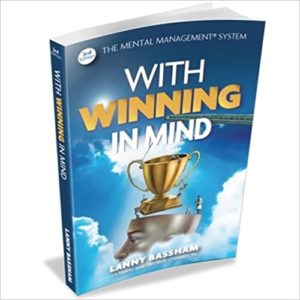 Lanny incorporated what he’d learned into a whole mental management program, which he wrote about in his book, With Winning In Mind. His system became so popular that other coaches and athletes started having him come train them.
Lanny incorporated what he’d learned into a whole mental management program, which he wrote about in his book, With Winning In Mind. His system became so popular that other coaches and athletes started having him come train them.
Mental Management to basketball
The obvious application is visualizing free throws but it could be used for nearly any part of the game. Late in the season, when the body gets worn out, how about taking some time to relax and visualize actions instead of running up and down the court?
As the state playoffs approach, wouldn’t the concept of Mental Management help your team perform better? Imagine what it will be like when you have a lead in the game and realize that you could actually win the championship? Or you face a challenge from the other team, maybe they make a couple of 3 point shots in a row… how are you going to respond? With confidence that you will overcome the challenge and emerge victorious? Why not?
Please post your thoughts on Mental Management for Basketball in the comments below. We would love to hear what you think or how you have applied these ideas!
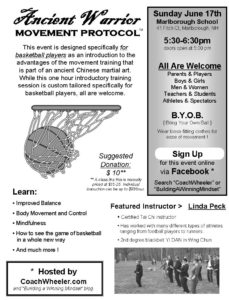 We just announced the first “Ancient Warrior Movement Protocol (TM)” workshop that will show you how to use Tai Chi for Sports performance improvement! It will be held at the Marlborough School on Sunday, June 17th (Father’s Day) from 5:30-6:30pm. Doors open at 5pm.
We just announced the first “Ancient Warrior Movement Protocol (TM)” workshop that will show you how to use Tai Chi for Sports performance improvement! It will be held at the Marlborough School on Sunday, June 17th (Father’s Day) from 5:30-6:30pm. Doors open at 5pm.

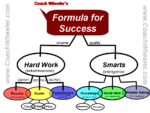
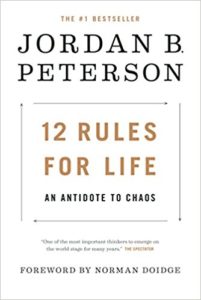
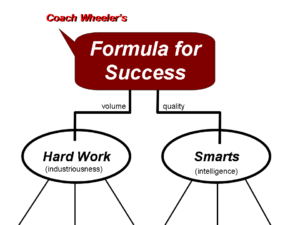 This probably won’t sound earth shattering but it should make immediate sense when you think about it. “The
This probably won’t sound earth shattering but it should make immediate sense when you think about it. “The  The Formula for Success has 3 parameters under “Hard Work”. They are (1) Passion, (2) Health and (3) Consciences. Let’s look at each in more depth.
The Formula for Success has 3 parameters under “Hard Work”. They are (1) Passion, (2) Health and (3) Consciences. Let’s look at each in more depth.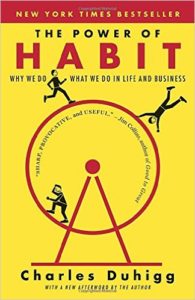
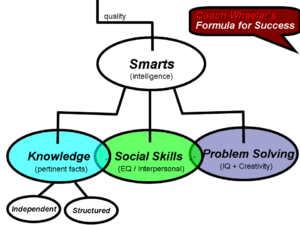 The second major component of Success is “Smarts” or “general intelligence”. Coach Wheeler breaks this down into 3 parts, (1) Knowledge, (2) Social Skills and (3) Problem Solving. Going back to Jordan B. Peterson, he has said that the studies show intelligence, as measured by IQ, is incredibly difficult to improve. On the other hand, Knowledge can continually be accumulated and you can gather facts or ideas that you can use across a wide variety of situations. Coach Wheeler also added Social Skills to his model for success and we will discuss how to build and leverage them more below.
The second major component of Success is “Smarts” or “general intelligence”. Coach Wheeler breaks this down into 3 parts, (1) Knowledge, (2) Social Skills and (3) Problem Solving. Going back to Jordan B. Peterson, he has said that the studies show intelligence, as measured by IQ, is incredibly difficult to improve. On the other hand, Knowledge can continually be accumulated and you can gather facts or ideas that you can use across a wide variety of situations. Coach Wheeler also added Social Skills to his model for success and we will discuss how to build and leverage them more below.
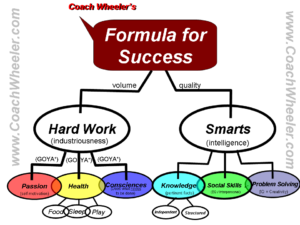
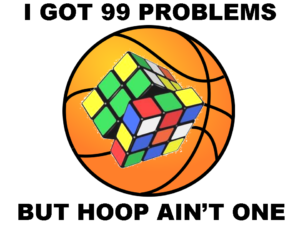 Everyone has problems. If you are alive, you have problems. They might be big, life-changing problems like a diagnosis of cancer or they could be minor inconveniences like a fly buzzing in your ear. That’s not why problem solving tactics don’t work. Problem solving is easier than you think, but I am getting ahead of myself.
Everyone has problems. If you are alive, you have problems. They might be big, life-changing problems like a diagnosis of cancer or they could be minor inconveniences like a fly buzzing in your ear. That’s not why problem solving tactics don’t work. Problem solving is easier than you think, but I am getting ahead of myself.

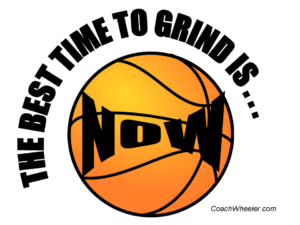 Summer is when you can make huge improvements as a basketball player… especially if you grind. GRINDing is all about
Summer is when you can make huge improvements as a basketball player… especially if you grind. GRINDing is all about  Affirmations are a powerful way for you, as an athlete, to overcome ways of thinking that are holding you back from becoming your best. Society has programmed many “limiting beliefs” into your mind over your lifetime. If you have read my post about
Affirmations are a powerful way for you, as an athlete, to overcome ways of thinking that are holding you back from becoming your best. Society has programmed many “limiting beliefs” into your mind over your lifetime. If you have read my post about 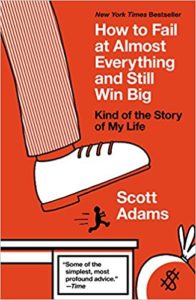
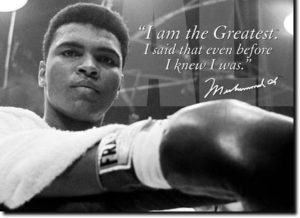
 – excerpted from How Ronald Reagan Changed My Life by Peter Robinson
– excerpted from How Ronald Reagan Changed My Life by Peter Robinson
 Do you want to win? Do you want to win all of the time? Really? What if you did? What if every attempt was successful and nothing ever went wrong? What if it became way too easy to do? How long would it take for you to tire of it? Winning is special because it is so difficult to do. We tend to value things in direct proportion to the price we pay for them. We do not learn very much standing on the top of the summit. All of the becoming happens on the way up the mountain. I hope you are having a lot of challenges along your journey of a dream. Resistance makes you stronger. If you are not having problems your goals are too low.
Do you want to win? Do you want to win all of the time? Really? What if you did? What if every attempt was successful and nothing ever went wrong? What if it became way too easy to do? How long would it take for you to tire of it? Winning is special because it is so difficult to do. We tend to value things in direct proportion to the price we pay for them. We do not learn very much standing on the top of the summit. All of the becoming happens on the way up the mountain. I hope you are having a lot of challenges along your journey of a dream. Resistance makes you stronger. If you are not having problems your goals are too low.
